
Recommendations and laws for distress signalling in many countries are behind the times. VHF radio – some with the red distress button – mobile or satellite phones and electronic visual distress signals (EVDS) are available, waterproof, affordable and reliable. Yet pyrotechnic flares are still Safety of Life at Sea (SOLAS) requirements. They find their way into all sorts of boats, even for owners, like me, who fear them and believe them to be unsafe.
UK flagged leisure vessels less than 13.7m do not by law have to carry flares or any life-saving equipment. Vessels flagged in other countries may be legally required to carry flares. However, in some countries British-flagged boats may be fined for having out of date flares on board. All liferafts come with flares and it is a requirement for all coded vessels to carry flares. So the question is: are flares dangerous, ineffectual, or both?
Old technology?
The majority of UK boat owners are not required to carry flares, or indeed any distress equipment, yet the manufacturers still insist flares are ‘essential’. The Maritime and Coastguard Agency (MCA) has recently stated that there is no downside to carrying flares on board, yet the Royal Yachting Association (RYA) is unable to get insurance to train leisure boaters in their use. All professional ship crew, at even the most basic level, get a chance to let off a flare during training.
The US Coast Guard has described the pyrotechnic flare as ‘old technology’ and now allows leisure boats to carry one EVDS and an orange flag instead of flares, using VHF radio as the primary source of summoning help.
This story is from the February 2022 edition of Practical Boat Owner.
Start your 7-day Magzter GOLD free trial to access thousands of curated premium stories, and 9,000+ magazines and newspapers.
Already a subscriber ? Sign In
This story is from the February 2022 edition of Practical Boat Owner.
Start your 7-day Magzter GOLD free trial to access thousands of curated premium stories, and 9,000+ magazines and newspapers.
Already a subscriber? Sign In

Orca sink yacht in Strait of Gibraltar
Spain's maritime rescue service, Salvamento Maritimo, has reported that a 15m (49ft) yacht sank in Moroccan waters in the Strait of Gibraltar following interaction with a pod of orca.

No kill cord or lifejackets were worn during fatal powerboat crash
A kill cord and lifejacket are useless unless worn-that's the warning from the Marine Accident Investigation Branch (MAIB), following its investigation into a powerboat crash that killed a 32-year-old woman and five-year-old girl on 2 October 2022.

Multihull sail work
Brush up on multihull sailing skills before heading off on charter with Gavin Le Sueur's guide to spinnaker handling, tacking and gybing

Five top causes of engine failure and how to prevent them
Jake Kavanagh talks to Sea Start marine engineer Nick Eales about how to avoid the five major causes of an engine breakdown at sea

Sail the Atlantic with strangers
Would you sail across the Atlantic with someone you've just met? Ali Wood meets the cruising crews who've done just that
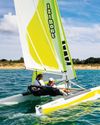
IZIBoat: simple sailing
Rupert Holmes sails an innovative catamaran design intended to widen participation in sailing among those with little time to get on the water in more conventional craft
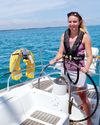
30 WAYS TO GET AFLOAT
From tall ships to small dinghies, you needn't own a boat to sail. Ali Wood looks at the options, and how skippers can also find crew
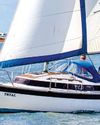
Boats for restoring under £20,000
Duncan Kent picks the best sub-35ft sail and power boats to look for when aiming to undertake a restoration on a budget
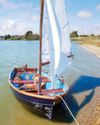
Seaworthy dinghies for less than £500
For low cost traditionally-styled GRP trailer-sailers, consider the Foreland and the Otter available at bargain basement prices
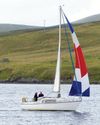
Playing with coloured sails
Maintaining an hourglass-shaped balloon and ratcheting up the log numbers